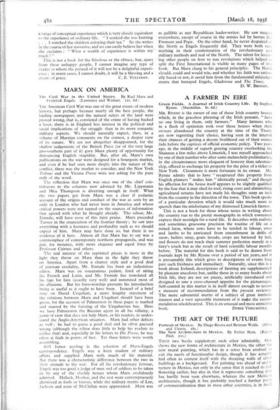A FARMER IN EIRE
MR. RYNNE is the owner of one of those Irish country houses which, in the graceless phrasing of the Irish peasant, " have no one living in them, only farmers." Many farmers who in a flush of optimism took over these houses when their owners abandoned the country at the time of the Treaty are now regretting their choice, having seen in the interval their chances of getting a decent livelihood out of their estates fade before the caprices of official economic policy. Two years ago, in the middle of superb grazing country overlooking the Shannon a few miles above Limerick, I was myself approached by one of their number who after some melancholy preliminaries, in the circumstances more eloquent of honesty than salesman- ship, offered to exchange his property for the price of a ticket to New York. Cloonmore is more fortunate in its owner. Mr. Rynne admits that to have " recaptured this property from English planters " makes him " idiotically proud," and though his affection for the house itself appears to be slightly qualified by the fear that it may shed its roof, rising costs and diminishing agricultural returns have not made his thoughts stray an inch from the country in 'the direction of the town. This book speaks of a particular devotion which it would take much more to quench than the misfortunes of my distressed Limerick farmer.
This is not a book for those whose tastes in writing about the country run to the pretty monographs in which townsmen express their nostalgia for a rural life. It describes with realistic and sometimes gruesome precision the routine of life on a mixed farm, where sows have to be tended in labour, ewes and lambs to be extricated from entombment in drifts of snow, heifers stray, goats invade, crops are battered by hail, and flowers do not reach their summer perfection merely at a fairy's touch but as the result of hard scientific labour months before. The, material for this book is said to be drawn from journals kept by Mr. Rynne over a period of ten years, and it is presumably this which gives to descriptions of events long past such freshness and immediacy. Naturally, since this is a book about Ireland, descriptions of farming are supplemented by pleasant anecdotes but, unlike those in so many books about Irish life, they are not set pieces, artificially introduced and designed to sate a cross-channel appetite for the picturesque. Self-control in this matter is in itself almost enough to secure a measure of recommendation from the present reviewer. The more substantial merits of a Subject of great intrinsic interest and a very agreeable treatment of it mate the recom- mendation wholehearted. This.is an unusual and most attractive














































 Previous page
Previous page